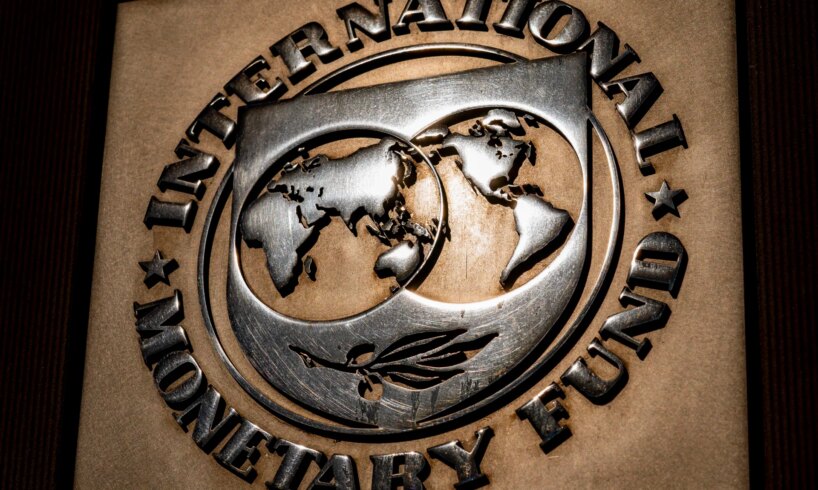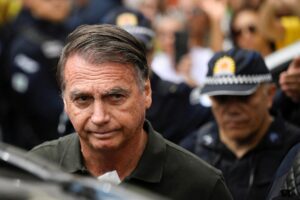
Islamabad, Pakistan – A new assessment by the International Monetary Fund (IMF) has concluded that corruption in Pakistan is behind an economic crisis driven by “state capture” – where public policy is manipulated to benefit a narrow circle of political and business elites.
The Governance and Corruption Diagnostic Assessment (GCDA), finalised in November 2025, presents a grim picture of a system marked by dysfunctional institutions that are unable to enforce the rule of law or safeguard public resources.
Recommended Stories
list of 4 itemsend of list
According to the 186-page report, corruption in Pakistan is “persistent and corrosive”, distorting markets, eroding public trust and undermining fiscal stability.
The report, requested by the Pakistani government, warns that without dismantling the structures of “elite privilege”, the country’s economic stagnation will persist.
While corruption vulnerabilities are present at all levels of government, according to the report, “the most economically damaging manifestations involve privileged entities that exert influence over key economic sectors, including those owned by or affiliated with the state.”
The report argues that Pakistan stands to gain substantial economic benefits if governance improves and accountability is strengthened. Such reforms, it notes, could significantly lift the country’s gross domestic product (GDP), which stood at $340bn in 2024.
“Based on cross-country analysis of the reform experience of emerging markets, IMF analysis projects that Pakistan could generate between a 5 to 6.5 percent increase in GDP by implementing a package of governance reforms over the course of five years,” the report said.
Stefan Dercon, a professor of economic policy at the University of Oxford who has advised the Pakistani government on economic reforms, said that he agreed that the absence of accountability in corruption cases was eating away at the country’s economic potential.
“Failure of implementation [of laws and principles of accountability] gives vested interests too often free rein and addressing this must be at the core of efforts for economic reform,” he told Al Jazeera.
Here is what we know about the IMF report, the areas of weakness it highlights, the policy recommendations it makes, and what the experts say.
What does the IMF report say?
Pakistan has turned to the IMF 25 times since 1958, making it one of the fund’s most frequent borrowers. Nearly every administration, whether military or civilian, has sought IMF assistance, reflecting chronic balance of payments crises.
The current programme was started under Prime Minister Shehbaz Sharif.
Pakistan Prime Minister Shehbaz Sharif, right, meets with the managing director of the IMF, Kristalina Georgieva, in Paris, France, June 22, 2023 [Handout/Prime Minister’s Office via Reuters]
The GCDA’s release comes ahead of the IMF executive board’s expected approval of a $1.2bn disbursement next month, part of the ongoing 37-month-long, $7bn programme.
Pakistan narrowly avoided default in 2023, surviving only after the IMF extended an earlier nine-month deal, which was followed by the ongoing 37-month programme.
According to the GCDA, Pakistan consistently ranks near the bottom of global governance indicators among nations. Between 2015 and 2024, the country’s score on control of corruption remained stagnant, placing it among the worst performers worldwide and within its neighbourhood.
At the heart of the IMF’s findings is the concept of “state capture”, where, according to the fund, corruption becomes the norm and, in fact, the primary means of governance. The report argues that the Pakistani state apparatus is frequently used to enrich specific groups at the expense of the broader public.
The report estimates that “elite privilege” – defined as access to subsidies, tax relief and lucrative state contracts for a select few – drains billions of dollars from the economy annually, while tax evasion and regulatory capture crowd out genuine private sector investment.
These findings echo a 2021 United Nations Development Programme (UNDP) report, which said economic privileges granted to Pakistan’s elite groups, including politicians and the powerful military, amount to roughly 6 percent of the country’s economy.
Ali Hasanain, an associate professor of economics at the Lahore University of Management Sciences, said the IMF’s description of elite capture is accurate but added that it was “hardly a revelation”.
He pointed to the 2021 UNDP report and other domestic studies that describe how Pakistan’s economic system has long served politically connected actors who secure “preferential access to land, credit, tariffs and regulatory exemptions.”
“The IMF diagnostic repeats what many domestic studies, including those by the World Bank and Pakistan’s own institutions, have already emphasised: Powerful interests shape rules to maintain their advantage,” he told Al Jazeera.
The new report notes that tax expenditures, including exemptions and concessions granted to influential sectors such as real estate, manufacturing and energy, cost the state 4.61 percent of GDP in the 2023 fiscal year alone.
It also calls for an end to special treatment for influential public sector entities in government contracts and urges greater transparency in the functioning of the Special Investment Facilitation Council (SIFC).
The SIFC, created in June 2023 during Sharif’s first term, is a high-powered body comprising civilian and military leaders and tasked with promoting investment by easing bureaucratic obstacles. Although positioned as a flagship initiative jointly owned by the government and the military, it has faced sustained criticism for a lack of transparency.
The report describes broad legal immunity granted to SIFC officials, many from the armed forces, as a major governance concern. It warns that this immunity, combined with the council’s authority to exempt projects from regulatory requirements, creates significant risks.
Highlighting the absence of transparency, the GCDA says the SIFC should publish annual reports with details of all investments it has facilitated, including concessions granted and the rationale behind them.
“The recently established Special Investment Facilitation Council, which has been vested with substantial authority to facilitate foreign investments, operates with untested transparency and accountability provisions,” the report said.
Judiciary and rule of law
The report identifies the judiciary as another critical bottleneck. Pakistan’s legal system is overwhelmed by more than two million pending cases. In 2023 alone, the number of unresolved cases before the Supreme Court increased by 7 percent.
Over the last 12 months, Pakistan has passed two constitutional amendments, both of which faced severe backlash from many in the legal community who said that they represent a “constitutional surrender”. In essence, the amendments create a parallel Federal Constitutional Court that critics say will reduce the powers of the Supreme Court, while also changing rules that guide how judges are appointed and transferred, in ways that opponents say could give the executive great control over whom to promote and whom to punish.
The government, however, has insisted that the changes were made to improve the efficiency and efficacy of the judicial system.
Similar credibility challenges affect the National Accountability Bureau (NAB) and the Federal Investigation Agency (FIA), the two principal bodies responsible for investigating corruption.
The GCDA cites a 2024 government task force, which found that NAB has, at times, exceeded its mandate and launched politically motivated cases. This selective accountability, the report says, has damaged public trust and created a climate of fear within the bureaucracy, slowing decision-making.
While NAB says it recovered 5.3 trillion rupees ($17bn) between January 2023 and December 2024, the report notes that conviction rates remain low.
The diagnostic calls for fundamental reforms to NAB’s appointment processes to ensure independence and a shift from “political victimisation” to “rule-based enforcement”.
Was the report necessary?
The IMF outlines reforms which experts acknowledged would be comprehensive if pursued by authorities.
Yet analysts also note that international institutions and domestic researchers have repeatedly made similar observations in the past, with little follow-through by the government.
Sajid Amin Javed, a senior economist at the Sustainable Development Policy Institute (SDPI) in Islamabad, says the fact that Pakistan is already under an IMF programme may compel the government to take the findings more seriously.
He said that the IMF report could have gone further than it has by acknowledging that many of its recommendations have been made by others in the past, “without bringing any change”.
“Perhaps the assessment could have been made to see why these failures happened,” he said.
Javed welcomed the report’s attempt to quantify economic losses from corruption, hoping it might push policymakers to act.
“Corruption and governance are intrinsically tied to each other. Corruption leads to weak governance, and weak governance promotes corruption, making them conjoined,” he said.
Hasanain, however, was more sceptical, questioning why the IMF waited for a formal request from the Pakistani government despite having its own internal assessment mechanisms.
Pakistan’s economy was close to a default in June 2023, before the resumption of the IMF’s support programme [File: KM Chaudhry/AP Photo]
What can the government do?
Analysts said Pakistan’s economic landscape has long been shaped by politically connected actors who enjoy preferential access to land, credit, tariffs and regulatory exemptions. The IMF’s observations, they noted, are not new.
Hasanain argues that corruption, including elite capture of markets, regulatory bodies and public policy, is political in nature and cannot be addressed without deeper reforms.
“Without a broader political awakening, governance reforms will remain technical fixes built on unstable foundations. Ultimately, elite capture is undone only when political incentives change,” he said.
Javed, meanwhile, pointed to what he called policy design capture, arguing that those responsible for drafting governance and anticorruption reforms are often part of the same elite ecosystem.
“Elite policy capture on policy design is perhaps the most important component which allows the elite capture. The report’s recommendations show that we must go for participatory and inclusive methods to get out of our current conundrum,” he said.
For Hasanain, the most urgent reform is a unified economic turnaround plan that is fully owned by the prime minister and communicated clearly.
He said that Pakistan’s economic landscape was cluttered with “committees, councils, task forces and overlapping ministries”, each producing its own documents without accountability.
“The government should consolidate these scattered structures into one clear reform platform with defined priorities, timelines and measurable outcomes. Progress should be published monthly, debated publicly, and subjected to independent scrutiny,” he said.
Hasanain argued that such consolidation would improve coordination, build public trust and signal seriousness to investors.
For Javed, the most immediate priority is reforming the public procurement system, which governs how government bodies buy goods and services using public funds.
“Our procurement system is not working on value of money, but instead it focuses on quantity of money, where lowest bidder wins the bid,” he said, arguing that this approach meant that contracts often did not go to those best suited to deliver what was needed. “This system needs urgent modernisation.”
“An urgent realisation is the order of the day that if we need to have a flourishing, transparent economy, we have no choice but to overhaul our entire economic framework,” Javed said.





